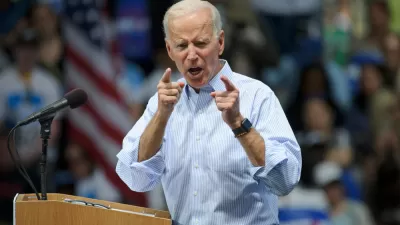Economics 101: It's difficult to reduce an activity if there's no price attached to it, so why are many environmentalists increasingly turning away from wanting to price carbon emissions?

"This month's fuel-tax riots in Paris and the defeat of a carbon-fee ballot measure in Washington state show the difficulty of getting people to support a levy on the energy sources that heat their homes and power their cars," report Zack Colman and Eric Wolff for POLITICO.
The story of the carbon tax’s fading appeal, even among groups that like it in principle, shows the difficulties of crafting a politically palatable solution to one of the world’s most urgent problems — including greenhouse gas levels that are on track to reach a record high this year.
"If it can't pass in Washington state right now, I'm not sure that says that there's much of a pathway at this moment nationally," said Sen. Jeff Merkley (D-Ore.).
California is the only state government that prices carbon emissions, using a cap-and-trade program created by the Global Warming Solutions Act of 2006, which was renewed two years ago, setting a goal to reduce emissions 40 percent below 1990 levels by 2030. Last year the state passed separate legislation to continue the cap-and-trade program through 2030.
Meanwhile, even the most liberal Democratic candidates this year gave carbon taxes scant if any mention in their climate platforms, focusing instead on proposals like a phaseout of fossil fuels and massive investments in wind and solar power.
For example, Rep.-elect Alexandria Ocasio-Cortez (D-N.Y), who supports a carbon tax, is "promoting it as just one possible element of a sweeping 'Green New Deal' that includes pouring huge amounts of money into renewable energy," note Colman and Wolff.
Could the explanation be as simple as an aversion to new taxes, particularly after the Republicans' landmark tax-cutting package?
"You do have this irony, and that is the policy that is overwhelmingly endorsed by economists of the right, the center and the left as the best way to reduce greenhouse gas emissions is inverse with what is politically feasible," said Barry Rabe, director of the Center for Local, State, and Urban Policy at the Gerald Ford School of Public Policy at the University of Michigan, who has studied carbon taxes.
Adding to the irony is that the public believes climate change is real, notwithstanding President Trump's rejection of climate science that is echoed by much of the GOP. Rabe points to a University of Michigan survey last month that found that 73 percent of Americans believe there is solid evidence of global warming.
Colman and Wolff delve into many aspects of carbon taxes—countries that have adopted and rejected them, and different types. A bipartisan congressional bill that has received much recent attention, H.R.7173 - Energy Innovation and Carbon Dividend Act of 2018, sponsored by Reps. Ted Deutch (D-Fla.) and Brian Fitzpatrick (R-Pa.), was unveiled on Nov. 27.
According to Deutch, the bill will price "carbon at $15 per metric ton of CO2e and increasing the price by $10 every year. The Treasury Department would return 100% of the net revenue back to the American people, a policy highlighted by a Treasury Department report as helping lower- and middle-income families." See one-page fact sheet [pdf].
Hat tip to Mark Boshnack.
FULL STORY: Why greens are turning away from a carbon tax

Maui's Vacation Rental Debate Turns Ugly
Verbal attacks, misinformation campaigns and fistfights plague a high-stakes debate to convert thousands of vacation rentals into long-term housing.

Planetizen Federal Action Tracker
A weekly monitor of how Trump’s orders and actions are impacting planners and planning in America.

San Francisco Suspends Traffic Calming Amidst Record Deaths
Citing “a challenging fiscal landscape,” the city will cease the program on the heels of 42 traffic deaths, including 24 pedestrians.

Defunct Pittsburgh Power Plant to Become Residential Tower
A decommissioned steam heat plant will be redeveloped into almost 100 affordable housing units.

Trump Prompts Restructuring of Transportation Research Board in “Unprecedented Overreach”
The TRB has eliminated more than half of its committees including those focused on climate, equity, and cities.

Amtrak Rolls Out New Orleans to Alabama “Mardi Gras” Train
The new service will operate morning and evening departures between Mobile and New Orleans.
Urban Design for Planners 1: Software Tools
This six-course series explores essential urban design concepts using open source software and equips planners with the tools they need to participate fully in the urban design process.
Planning for Universal Design
Learn the tools for implementing Universal Design in planning regulations.
Heyer Gruel & Associates PA
JM Goldson LLC
Custer County Colorado
City of Camden Redevelopment Agency
City of Astoria
Transportation Research & Education Center (TREC) at Portland State University
Jefferson Parish Government
Camden Redevelopment Agency
City of Claremont





























